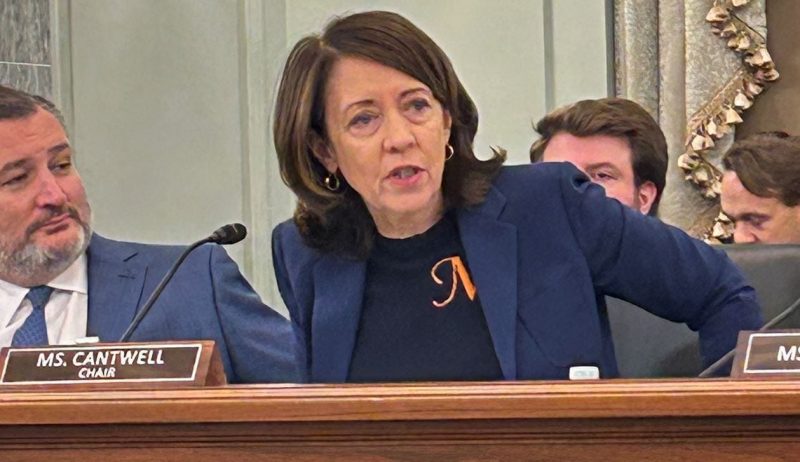
Sen. Maria Cantwell, Wash., the top Democrat on the U.S. Senate Commerce Committee, on Monday, Aug. 25 sent a letter to NCAA Division I school chief executive officers and governing boards to “express my deep concerns” about a Republican-authored college-sports bill that has passed two House of Representatives committees and is set for a floor vote that could occur in September.
If the bill passes the House, the focus likely would turn to the Senate Commerce Committee. Its chair, Ted Cruz, R-Texas, has been working on a discussion draft of a separate college-sports bill — and advocating for such a measure — for more than two years. Not long after Republicans re-claimed a Senate majority last November, Cruz said such legislation would be a priority for him and the committee.
Titled the SCORE Act (Student Compensation And Opportunity Through Rights and Endorsements), the bill would establish a variety of national rules concerning how college sports operate. It includes antitrust-exemption language that specifically would allow the NCAA, and potentially the new College Sports Commission, to make operational rules affecting schools and athletes in areas that have come into legal dispute in recent years. That would include rules about transfers and the number of seasons for which athletes can compete.
PATH TO PLAYOFF: Sign up for our college football newsletter
NCAA President Charlie Baker said recently he would be “fine” if the bill’s antitrust protection for NCAA rules would last for only two or three years before being subject to Congressional review.
The bill also would put into federal law college athletes’ name-image-and-likeness activities, basically following the terms of the recent settlement of three athlete-compensation antitrust cases against the NCAA and the Power Five conferences that is generally known as the House settlement. In addition, the bill would require most Division I schools to provide a series of health and educational benefits for athletes that are currently called for under NCAA and some conferences’ rules, but do not have the force of law.
Her new five-page letter amplifies those criticisms and adds others. The letter appears to be an effort to counter extensive lobbying efforts by the NCAA and the Power Four conferences, who have been encouraging school officials to express support for the bill to their respective elected officials. While Congress has been on its August recess, two Democratic members of the House from Texas — Henry Cuellar and Vicente Gonzalez — have added their names to the bill’s list of co-sponsors.
Cantwell wrote in her letter that the bill “will incentivize a Power 2 conference system that will create inequities for other conferences and leave behind small to mid-sized schools,” and that she wants to “work with you” to find alternatives and that she is inviting these school officials “to provide input on legislation that will protect the college athletics system and its athletes and set up universities and their programs to thrive in the future.”
Cantwell did not set a deadline for responses. However, she believes that the more university leaders know about the bill, the more they will be concerned about it, a Commerce Committee aide to Cantwell told USA TODAY Sports. The aide added that Cantwell is hoping to hear initial thoughts before the House considers the bill. The aide requested anonymity because they are not authorized to speak publicly on the matter.
Cantwell specifically claimed that the bill’s language would allow the NCAA to alter the House settlement’s basic metric for determining the amount of money athletes would be able to receive in so-called revenue-sharing payments from schools so that it could increase from the 22% of certain revenues of the association’s power-conference schools.
At issue for Cantwell is a provision that says the NCAA would be able to create a cap that is ‘at least’ 22%. Given that many schools are struggling to find the money to pay the athletes, whether NCAA Division I governance groups would authorize payments above 22% – which would favor schools in bigger conferences – is an open question.
She also claimed that the bill would put into law recent changes in the NCAA Division I governance structure that broaden the voting power of the Power Four conferences in the division’s top rules-making groups, the Division I Board of Directors and newly created Division I Administrative Group.
“We do not need a federal law that would entrench the advantages the biggest conferences already have … ” Cantwell wrote.
But with Cuellar adding his name to the bill on Aug. 19 and Gonzalez doing so on Aug. 22, there are now four Democrats who have backed the legislation. It originated with Rep. Gus Bilirakis, R-Fla., and gained co-sponsorship from four prominent Republican members of the House who are committee chairs and/or part of GOP leadership in the chamber: Jim Jordan, Ohio; Brett Guthrie, Ky.; Tim Walberg, Mich; and Lisa McClain, Mich.
With Republicans holding a 219-212 majority in the House, all of this strongly indicates that the bill would have enough votes to pass if House Speaker Mike Johnson (La.) and Majority Leader Steve Scalise (La.) want to bring it to the floor.

